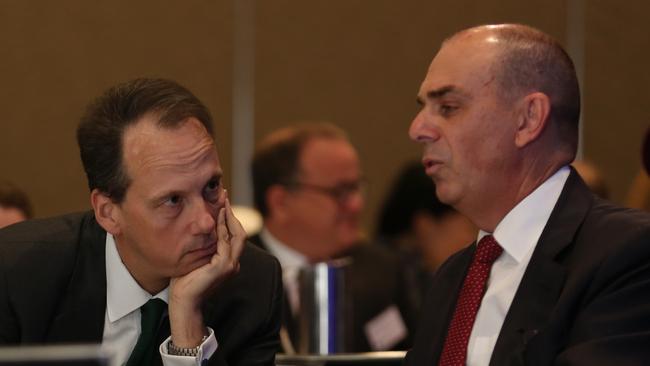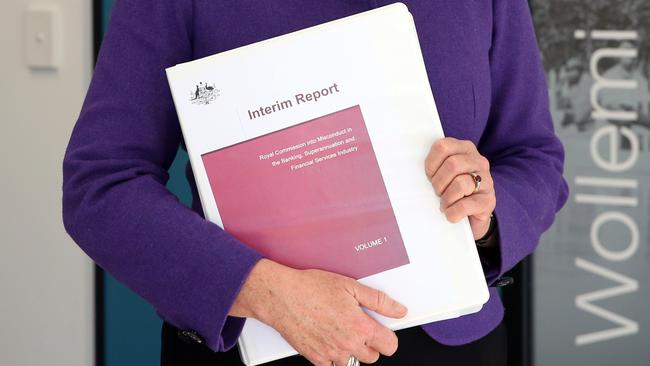Banking royal commission: Watchdogs respond to Hayne’s interim report with concessions and resistance
ASIC has accepted Hayne’s criticism it does not go to court often enough, as it flags rural loans crackdown.

The corporate watchdog has accepted banking royal commissioner Kenneth Hayne’s criticism it does not go to court often enough against the big end of town, pledging more criminal and civil action against large financial institutions.
It came as the banking regulator warned of a looming crackdown on improper agribusiness lending at Australia’s largest banks, telling the royal commission it was “commencing a review of business banking practices within the major banks” after trying to shore up standards in the mortgage lending business.
Agribusiness lending loomed large during the royal commission hearings, as hundreds of farmers complained they were forced off their properties in the wake of loose and lax lending standards and overly punishing requirements for properties experiencing hardship.
In its submission to Mr Hayne’s interim report, the Australian Securities and Investments Commission said it needed increased powers, including a role in the new Banking Executive Accountability Regime (BEAR), which should be extended to cover the entire financial services industry.
And it again complained that it was underfunded.
“ASIC accepts that it must alter its enforcement priorities and practices within the financial sector — and particularly for larger financial institutions — to be more agile in initiating and prosecuting court action, and in many instances even commencing with it,” counsel for ASIC, Peter Collinson, said.
“ASIC acknowledges that for larger financial institutions it should deploy enforcement tools towards the apex of the enforcement pyramid more frequently, particularly criminal and civil court actions.
“ASIC accepts that the proper starting point is for it to ask the question: why not litigate?”
In its own response to the royal commission’s interim report, the Australian Prudential Regulation Authority defended its failure to take badly behaved banks and bankers to court, arguing its response to misconduct has been “broadly appropriate” and that it was “ultimately” the bank boards that had to take ownership for their actions if they were to drive “behavioural change” across the industry.
The prudential regulator revealed the many banks, insurers and super funds had lied to it for years, noting that the royal commission revealed “unreported breaches of other regulators’ rules and material deficiencies in the implementation of policies that were not evident from representations made to APRA”.
APRA also said vertically integrated banks had assured the regulator they had frameworks that were managing conflicts of interests, but that in reality “these have not been implemented effectively in practice”.
It said this was “unsurprising” given that APRA only had 200 frontline staff to monitor about 600 institutions. The government this week boosted APRA’s coffers by $60 million, after topping up ASIC’s funding by $70m earlier in the year.
APRA said it could increase its scope to crackdown on bad banks, but that the industry needed to take greater responsibility for cleaning up its act.
“Solutions to past problems must involve industry taking more responsibility, not less, for maintaining appropriate standards of conduct and guarding against misconduct,” APRA said.
APRA also said there was a risk that launching legal action too regularly could put banks off from taking risk which could limit access to financial services and result in more expensive products.
However, ASIC has said funding falls well short of what is needed to police the financial sector and live up to the demands of politicians, which have been bashing the regulator for being asleep at the wheel.
Both ASIC and APRA said the BEAR, which currently only covers banks, should be extended to other financial services entities and credit providers.
ASIC said it should be allowed to make regulatory rules, as the UK regulator can, and design and distribution rules should be extended to cover credit.
And it said it should also be allowed to require staff training when using its new product intervention power and an exemption meaning entities regulated by sister agency APRA don’t have to have “adequate resources to provide financial services and carry out supervision and have adequate risk management systems” should be canned, it said.
“These exemptions do not presently take into account the fact that APRA’s focus is on prudential matters not conduct,” Mr Collinson said.
He repeated ASIC’s warning, which it has also given directly to politicians in Canberra, that the regulator’s budget was too small to meet the growing demands on it.
The equivalent Hong Kong regulators have a combined budget 50 per cent bigger to cover an industry a third the size, he said.
“ASIC would be assisted by an increase in resources, particularly permanent or core increases to funding as opposed to increments of short-term project-based funding,” he said.
The regulator also drove a further nail into the coffin of disclosure-based regulation, which has been the model in Australia since 1997’s Wallis inquiry, but has been all but abandoned following wave after wave of scandal in the finance sector over the past half a decade.

Responding to Mr Hayne’s question about whether complex laws should be made simpler, Mr Collinson said: “In many cases, the most effective way to achieve regulatory simplicity would be to simply prohibit certain types of conflicts or conduct (e.g. the prohibition on selling financial products door to door), rather than to require burdensome disclosure and risk management rules that can be uncertain or very costly in their application.”
APRA also argued that laws for regulating superannuation legislation needed to be overhauled, and that ASIC should take primary responsibility for clamping down on bad behaviour. Kenneth Hayne had slapped down APRA for never taking a superannuation fund to court, despite knowing of systemic breaches of the law across major funds.
“In APRA’s view, it is also important that each regulator stays true to its mandate and uses powers for their intended, legislated purpose,” APRA said.
APRA put forward several proposals to improve the financial system, including better incentive structures that rewarded executives for complying with community expectations, better funding and powers for regulators and stronger industry codes to monitor self regulation.
However, it said banning all incentive payments made to bankers could have “unintended
consequences” such as leading to higher prices for services.




To join the conversation, please log in. Don't have an account? Register
Join the conversation, you are commenting as Logout